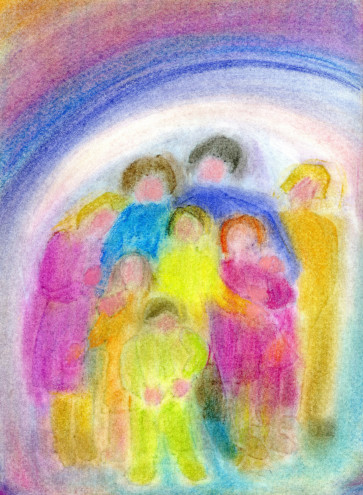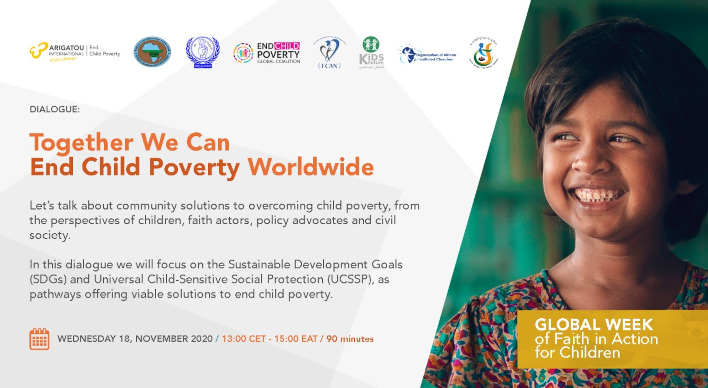Grown-up Support Needed for Children’s Visionary Ideas

Drawing above: Being Together, 1994, The Netherlands © Wim Oostdam et Annelis Wuillemin / ATD Fourth World / CJW-AR1000101276_08

Statement by Isabelle Pypaert Perrin, Director General of ATD Fourth World
Arigatou International Webinar, 18 November 2020
“Together we can stop child poverty”
First of all, I would like to thank all those who’ve spoken before me, especially the children. They know how to tell us what’s essential!
Children stand up to poverty
All children are sensitive to injustice. Those who grow up in poverty are even more so because they and their families have experienced rejection themselves. Therefore they have a great longing to be respected.
From their parents, these children learn courage as well as a sense of dignity and solidarity. In spite of all the difficulties they face, their parents work so hard every day to make life possible.
From the outset, these children take part in the life and daily struggle of their family and community. This is because they are aware from a very young age that life is too hard for their family. And so they try to do their part.
For example, Djuma, who is 11, told us recently:
- “This period of the epidemic is the worst I have known. We’ve nothing left, and we’re hungry. My parents aren’t allowed to go out to work. If they do, they get a fine that we won’t be able to pay. So I’m the one who goes out to look for something to eat”.
The children of families in poverty are already active and mobilised. In terms of participation, we can say that they are ahead of the others!
But children from all walks of life can stand up and insist that some children should not be abandoned or side-lined. To do this, however, they need the opportunity to act locally. And they need adults who will listen to them, adults who want the same things that they do.
Tapori, a network of friendship
This is why ATD Fourth World created Tapori, a network of friendship between children from different backgrounds and countries. Through meetings, campaigns, letters and the Tapori Newsletter, children talk to one another about what they are experiencing in life. They can discuss questions they have and, over time, work together to find solutions to the injustice they see.
- For example, in a large city where war has been raging for years, Tapori children have decided to try to be the “friends of children who have no friends“. They’ve chosen to visit former child soldiers that everyone else is afraid of, but who are still the same age as these Tapori children.
They have also invited to join their activities refugee children from neighbouring countries who are alone and treated badly. “A child is a child“, they say. “So why are some children set apart?”
Elsewhere, a secondary school teacher named Marie discussed children’s rights with her students, in particular the right to education. Together, they came up with an idea. “What if we implemented this right in our classroom, right now, by making sure that all the children in our class learn the material? At the end of the year, everyone should be able to move on to the next class. Let’s write down everything we are going to do to accomplish that goal.”
As a result, the atmosphere in the classroom changed. No more taunting, no one in the class left on the side lines. No one saying, “That kid can’t learn anything”. Instead, there is more cooperation and mutual support among students. Even the parents are involved!
In yet another country, on the anniversary of the Convention on the Rights of the Child, Tapori children from an informal neighbourhood on the outskirts of the capital invited their parents and the mayor of their neighbourhood to a meeting. They told the mayor about everything their families had done over the past ten years to organise life in the unattributed plots of land. Establishing property titles there is a very slow process. The mayor was impressed by what the children told him. Now, he understands the urgency of making progress on the issue of property titles and of guaranteeing families’ rights to decent housing.
Last year, Paula, Alma and Raquel represented their Tapori group to speak at the United Nations on World Day to Overcome Extreme Poverty. They expressed their desire for all children to have the same opportunities, but also something more unexpected.
- “With all the difficulties in our lives, it’s hard to be children”, they said. “But we believe that it is even harder to be grown-ups like our parents. On top of everything they have to deal with, they care about us all the time. They are the ones who need to be supported”.
You don’t often hear children growing up in poverty say publicly that their parents are heroes. It takes a long time for such children to overcome their sense of shame and to dare express pride in their community.
Children can guide us if…
Children are actors of change. They can get their community moving and they challenge adults to get involved. Children also know how to have a strong public voice anchored in their own experience and that of their family. We can learn a lot from them. They can even inspire and strengthen us when it comes to our own adult responsibilities.
But what does it take for other people to hear what children have to say, especially children with very difficult lives? I believe three things are necessary:
- First, children must be able to come together and, over time, form bonds with each other, developing friendships. They must be able to teach each other things they know in a spirit of cooperation rather than competition. They must learn to take time to think about what they see and to be able to react to these things. We must help them to speak out not only for themselves, but with others in mind too.
- Second adults need to engage with children in a way that allows all of them to have a place, a way that enables them to express themselves based on their own experience. This requires adults to work hard to be attentive to the most disadvantaged among the children. It also requires overcoming the prejudices that all our societies create with regards to people in poverty.
- Third, we must be ready to hear words that destabilise us. The worst would be to use children to illustrate what we think, to put our own words in their mouths. But if children say what is really in their hearts, they will lead us into something unexpected and new! And, in order to be inventive about the future, our world terribly needs what children bring that is new – both from their heads, and from their hearts.


